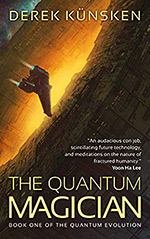
![]() Arifel
Arifel
1/2/2020
![]()
The Quantum Magician is a grim but enjoyable heist, though it never quite builds its post-human worldbuilding elements to their full potential.
It's funny that, despite listing "found families" among my favourite tropes, this doesn't often translate into found family's grouchy, backstab-prone cousin, the heist story. It might be the much higher trust deficit and that's usually present in a team put together explicitly to do a single job, or the fact that characters trend towards chaotic neutral and don't tend to smooth out each other's rough edges in the same way. Or, maybe I just don't like the actual heist-y part of a heist, which sort of functions as a reverse mystery: by definition, we know in advance who did it, we're just not sure about the how. It's quite rare for the goal in a heist to be something an audience a priori cares about, so it's down to the author to invest us in some combination of characters, mechanics or worldbuilding so we want to follow our not-heroes through the inevitable failures, double-crosses and eleventh-hour plan revisions to get their job done.
The Quantum Magician goes in hard on many elements of its worldbuilding, putting us in a far future spacefaring society with some recognisable but unusual political powers. Bel's client, Iekanjika, works for the Sub-Saharan Union, a small player in galactic terms, approaching him to move 12 warships through a puppet-controlled wormhole. Bel very quickly realises there's something "off" about these ships, which shouldn't exist in the first place and employ highly advanced technology beyond what most of the major players in the galaxy are using at this point. The first ten percent of the book puts us through some early sleuthing and action scenes which showcase Belasarius' abilities as a homo quantus: a member of a post human species able to enter mentally altered states known as savant - where the individual maintains their identity but has significantly higher data processing capacity, at the expense of interpersonal abilities - and fugue, which suppresses their identity entirely. These different brain states take a great deal of additional energy and there are clear physiological tolls to entering it, with fugue state in particular inducing levels of internal heat which homo quantus are only partially adapted to cope with. Bel, we learn, is a highly unusual Homo Quantus, both in terms of his abilities, which don't function as intended, and because he has left the rest of his people and struck out on his own in the galaxy, turning his back on the knowledge-seeking purpose his species were created for.
http://www.nerds-feather.com/2018/09/microreview-book-quantum-magician-by.html